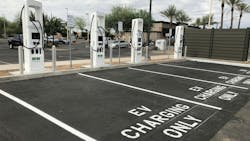FHWA Allots Grants for EV Charging and Refueling Infrastructure
Today, the U.S. Department of Transportation’s Federal Highway Administration (FHWA) announced $635 million in grants to continue building out electric vehicle (EV) charging and alternative fueling infrastructure with funding from the Bipartisan Infrastructure Law’s signature zero-emission refueling infrastructure programs.
The grants fund 49 projects that will deploy more than 11,500 EV charging ports and hydrogen and natural gas fueling infrastructure along corridors and in communities across 27 states, four federally recognized tribes and the District of Columbia.
As of today, there are more than 206,000 publicly available EV charging ports with 38,000 new public chargers turned on in 2024 thanks to private sector investment, and a combination of direct federal funding, federal tax incentives and state and local funding.
“The Biden Administration has made historic investments to support the EV transition and make sure it’s made in America,” said U.S. Transportation Secretary Pete Buttigieg, in a statement. “These investments will help states and communities build out a network of EV chargers in the coming years so that one day, finding a charge on a road trip will be as easy as filling up at a gas station.”
Out of the total investment, $368 million of the grants will be allocated for 42 community projects that expand EV charging infrastructure within communities across the country, while $268 million will go towards seven corridor fast-charging projects that build out the national charging and alternative-fueling network along designated Alternative Fuel Corridors.
The buildout of hydrogen transportation fueling infrastructure complements and accelerates America’s growing hydrogen economy and meets growing market demand by targeting public investments to amplify private sector momentum in deploying zero-emission medium- and heavy-duty vehicles.
The awards also support the President’s Justice40 Initiative, which aims for 40% of the overall benefits of federal investments to flow to disadvantaged communities, with 67% of the funding going to sites located in disadvantaged communities. Investing in these communities creates jobs, reduces transportation costs, and helps mitigate healthcare costs caused by air pollution, while also ensuring all equitable access to EV charging infrastructure
A full list of grant recipients can be found here.
Source: Federal Highway Administration
